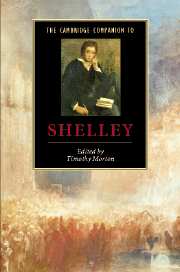8 - Language and form
from Part III - Ideas, beliefs, affiliations
Published online by Cambridge University Press: 28 January 2007
Summary
Inspired by his revolutionary visions, we sometimes forget what a verbal artist Shelley was and remains and how much that artistry is rooted in a definite theory of language. When he finally justifies his craft with A Defence of Poetry in 1821, Shelley sees poetry, broadly defined, as beginning when the most primitive person uses 'language and gesture' to produce 'the image of the combined effect of . . . objects and his apprehension of them'. That primal moment is poetic because it is metaphorical. It is a transfer of something (a perception, itself metaphoric in being a transfer between reception and response) into something quite different (the verbalized image). Such a theory allows Shelley to make deliberate poetry, the reenactment of that earlier transfer, a transformation of existing forms of language into a re-envisioning of the world as we know it. Poetic language, he writes in his Defence, is 'vitally metaphorical; that is, it marks the before unapprehended relations of things', making us see perceptions (as well as words) in terms of others not yet connected to them. This sense of language, poetry, and revolution as essential to each other is so crucial to Shelley's world view by the time of his mature writing that the very life of true civilization for him comes to depend on the constant renewal of language by the poetry with which it began: 'if no new poets should arise to create afresh the associations' by which a culture understands itself, he fears, 'language will be dead to all the nobler purposes of human intercourse' (Pr 278).
- Type
- Chapter
- Information
- The Cambridge Companion to Shelley , pp. 145 - 165Publisher: Cambridge University PressPrint publication year: 2006
- 1
- Cited by



